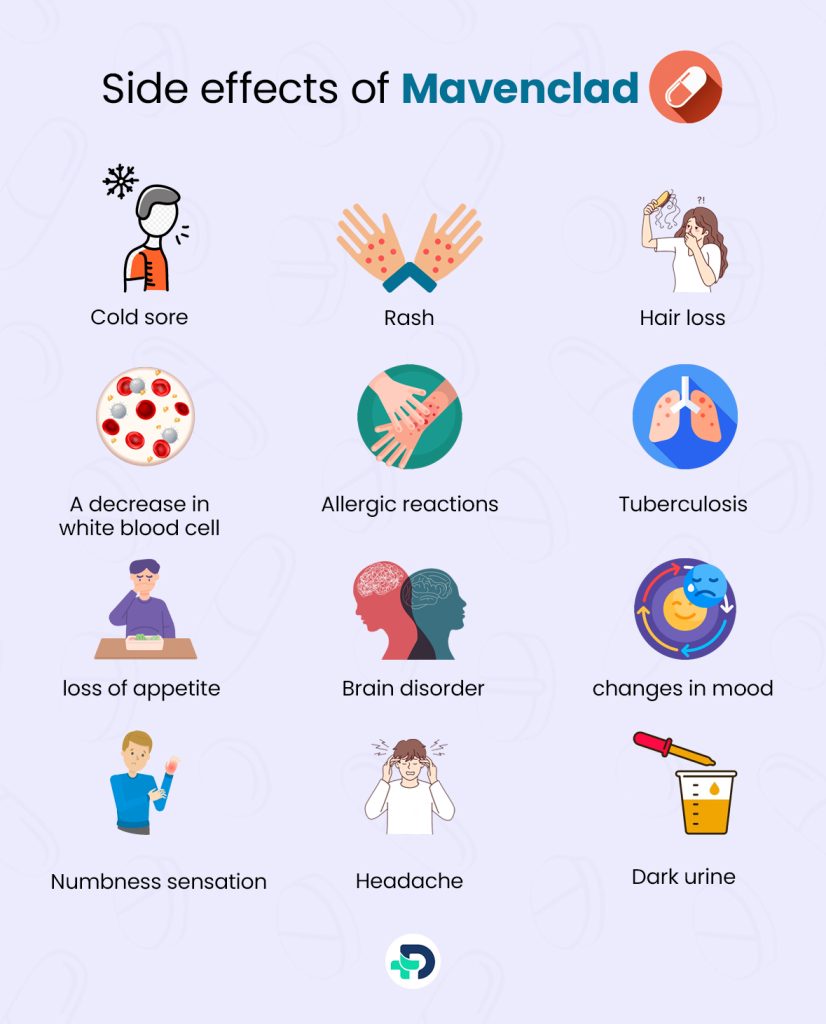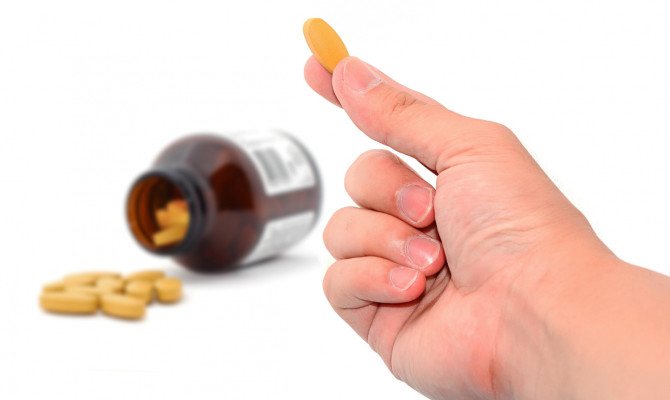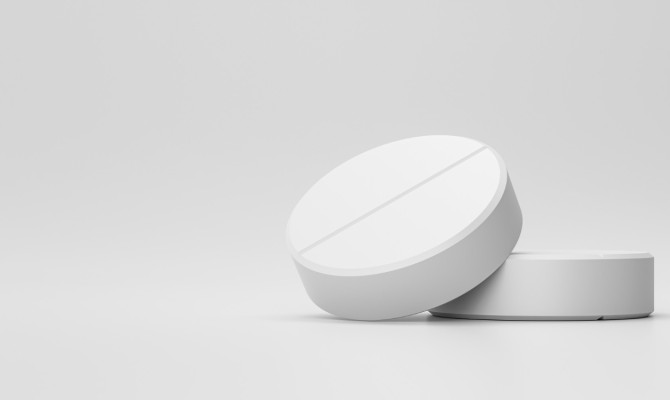A Closer Look at Mavenclad: Uses, Administration, and Safety

- Mavenclad
- 01 Sep 2023
Introduction
What is Mavenclad?
Mavenclad is a medicine that contains an active ingredient called cladribine, which belongs to a group of medicines called cytotoxic agents, a class of medicines that reduce inflammation by causing destruction to lymphocytes (a type of white blood cell). It is beneficial in minimizing relapses of symptoms and the development of impairment related to multiple sclerosis in adults. 1Introduction | Researched based study from Medicines.org.uk

Uses
Uses of Mavenclad
- Mavenclad is a prescription drug that is indicated to treat active secondary progressive illness and other relapsing forms of multiple sclerosis.
- Because of its safety profile, it is typically prescribed to patients who have tried another medication (for the illness) but found it to be intolerable/ineffective. 2Uses | Researched based study from Food and Drug Administration
Multiple Sclerosis
What is multiple sclerosis?
- An autoimmune disorder called multiple sclerosis (MS) develops when the immune system unintentionally targets the body’s healthy cells.
- The myelin sheath, which serves as a protective covering and covers the nerves in the brain and spinal cord, is susceptible to immune system attacks in patients with this illness.
- The brain, spinal cord, and eyes all experience symptoms when the myelin sheath is damaged because it hinders the brain from delivering nerve signals to other regions of the body. 3Multiple Sclerosis | Researched based study from Cleveland Clinic
Dosage Strength
Strength & Dosage forms
- Mavenclad comes in the form of round, white, biconvex tablets that are inscribed with ‘C’ on one side and ’10’ on the other.
- Each packet contains 1, 4, 5, 6, 7, or 8 blister-sealed pills with a 10mg dosage that are packaged in a cardboard wallet. 1Strengths | Researched based study from Medicines.org.uk
Administration
How is Mavenclad Taken?
- Mavenclad will be advised to you over the course of two years in two separate treatment sessions.
- Each treatment course has two treatment weeks that are spaced out by a month at the beginning of each treatment year.
- Typically, you take one or two tablets every day for four or five days throughout a treatment week.
- The tablets can be taken with or without meals, and neither chewing nor crushing them before swallowing is recommended.
- If you have concerns about the administration, speak with your doctor. 2Administration | Researched based study from Food and Drug Administration
Side Effects


Side Effects of Mavenclad
If any of these symptoms bother you or are persistent, seek assistance from your doctor:
Common side effects:
- Cold sore
- Rash
- Hair loss
- A decrease in the quantity of neutrophils (a particular type of white blood cell)
- Allergic reactions such as itching, rash, swelling of the lips, tongue/face, and/or hives.
Uncommon side effects:
- Tuberculosis 1Side Effects | Researched based study from Medicines.org.uk
Serious side effects (which can lead a patient to discontinue taking Mavenclad medication):
- Shingles (viral infection) symptoms that may appear as a “band” of intense pain and a blistering rash on one side of the upper body/face with headache, general malaise, feverishness, burning/tingling/numbness sensation in the affected area that requires immediate attention/treatment.
- Liver problems associated with symptoms such as loss of appetite, nausea/vomiting, stomach pain, tiredness, jaundice (yellow skin/eyes), and/or dark urine may necessitate intervention/stopping treatment with Mavenclad medicine
- Progressive multifocal leukoencephalopathy (a rare brain disorder) may occur associated with symptoms such as memory lapses, speech & communication difficulties, and/or changes in mood/behaviour. 1Side Effects | Researched based study from Medicines.org.uk
Contraindications
Who should avoid taking Mavenclad?
Mavenclad should be avoided:
- If you have an allergy or hypersensitivity to cladribine or any other medication ingredients
- If you are an HIV-positive patient
- If you suffer from active tuberculosis infection
- If your immune system is compromised due to a medical condition or because you are taking medications such as ciclosporin, cyclophosphamide (used to suppress the immune system after organ transplantation), or methotrexate (used to treat conditions such as psoriasis/rheumatoid arthritis)
- If you suffer from active cancer. 1Contraindications | Researched based study from Medicines.org.uk
Precautions
Precautions for Mavenclad
Inform your doctor if any of these apply to you before taking Mavenclad:
- Infection with associated symptoms such as headache, fever, painful muscles, and/or feeling unwell
- Previous history of suffering from cancer.
Patients with renal (kidney) problems:
- Patients who have moderate to severe kidney problems should refrain from taking Mavenclad medication.
- Before using the medicine, it is recommended that you talk to your doctor.
Patients with hepatic (liver) problems:
- Patients who suffer from hepatitis (liver inflammation) should refrain from taking Mavenclad medication.
- Before using the medicine, it is recommended that you talk to your doctor.
Use in particular populations:
Pregnant women
- If you are pregnant or considering a pregnancy, it is advised that you avoid using this medicine because it could seriously harm the unborn child.
- Effective contraceptive measures should be used by women of childbearing potential to avoid accidental pregnancy during and after stopping treatment with the medicine for the next 6 months.
- It is advised that you consult your doctor before taking Mavenclad medication.
Breastfeeding women
- Breastfeeding mothers should refrain from using Mavenclad medicine because it is unknown whether it passes via breast milk and could cause harm to the breastfed infants.
Use in children:
- Mavenclad is not recommended for use in patients (aged below 18 years) as the safety and efficacy of the use of medicine is not established in this age group.
Use in geriatric (elderly) patients:
- In order to prevent adverse effects in this age group, patients who are elderly (65 years of age or older) should use Mavenclad medication cautiously and in consultation with their healthcare physician. 2Precautions | Researched based study from Food and Drug Administration
Recommended tests before and during treatment with the Mavenclad medicine:
- A blood test before, during, and after Mavenclad treatment may be indicated to determine whether any complications can be caused by the use of medicine in the patient. 1Precautions | Researched based study from Medicines.org.uk
Interactions
Drug interactions
Drug interaction:
Several drugs should not be taken while taking Mavenclad due to potential interactions with the drug. To avoid adverse effects, make sure to inform your doctor about all of the drugs you are currently taking, including any of those listed below, before starting treatment with Mavenclad.
- Corticosteroids taken over a long period of time (Ex. prednisone)
- Alemtuzumab (used to treat leukemia)
- Daclizumab, fingolimod, natalizumab, teriflunomide (other medicines used to treat multiple sclerosis).
Takeaway
Takeaway Tips
- Mavenclad is a medicine that contains an active ingredient called cladribine, which belongs to a group of medicines called cytotoxic agents, a class of medicines that reduce inflammation by causing destruction to lymphocytes (a type of white blood cell)
- Mavenclad is indicated to treat active secondary progressive illness and other relapsing forms of multiple sclerosis
- An autoimmune illness called multiple sclerosis develops when the immune system accidentally targets the body’s healthy cells. Patients with this condition will have immune system attacks that damage the myelin sheath, a protective covering that coats the nerves in the brain and spinal cord.
- Mavenclad medicine is not recommended for use if you are hypersensitive/allergic to cladribine, and/or suffer from active tuberculosis infection/cancer
- Women who are pregnant or nursing should refrain from using the medication because it could harm the unborn child or breastfed infant
- Patients with moderate to severe kidney problems or hepatitis should avoid taking this medicine. 1Takeaway | Researched based study from Medicines.org.uk 2Takeaway | Researched based study from Food and Drug Administration
Any feedback on this article?
 This Articles content was accurate
This Articles content was accurate Very Informative Article
Very Informative Article I have a question or a comment
I have a question or a comment
 This article contains inaccurate content
This article contains inaccurate content This article was not helpful
This article was not helpful I have a question or a comment
I have a question or a comment
We appreciate your helpful feedback!
Checkout our social pages
References
-
Medicines.org
Introduction | Strengths | Side effects | Contraindications | Precautions | Interactions | Takeaway tips
-
Food and Drug Administration
Uses | Administration | Precautions | Takeaway tips
-
Cleveland Clinic
Multiple Sclerosis


































